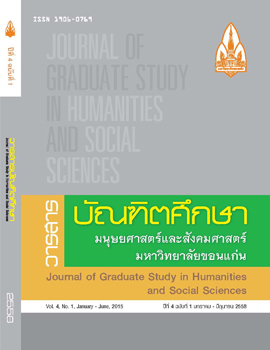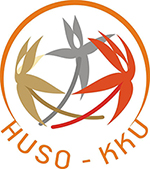Meeting Specific English Oral Communication Needs of Thai Learners through Interactive Self- Initiated Simulations for Oral Skill Improvement
คำสำคัญ:
specific oral communication needs, interactive, self- initiated simulations, ความต้องการเฉพาะทางในการสื่อสารภาษาอังกฤษในการพูดเน้นการสื่อสารระหว่างกัน, สถานการณ์จำลองที่ริเริ่มโดยผู้เรียนเองบทคัดย่อ
Although English is considered as a working language of the ASEAN to connect people from different cultures, most of Thai learners haven’t been able to effectively achieve this goal especially in terms of oral communication (Khamkhien, 2010, Wiriyachitra, 2001; Kongsom, 2009). In spite of recognizing the learners’ needs, wants and lacks of English language (Hutchinson, T. and Waters, A., 1987), most of Thai teachers are still struggling to help their learners to improve their oral communication skills. This is because they recognize that learners with knowledge and skills of English can better keep up with a rapidly changing world. Thus, this study aimed at serving the specific oral communicative needs of the target learners through self-initiated simulations which help bring authentic language into classroom context (Konetes, 2010; Tompskins, 2011). This was carried out according to the principles of language acquisition (Tomlinson and Masuhara, 2009) within the learner centeredness (Tudor, 19960) where learners were empowered to actively participate in the learning process with their own initiation. The learners’ higher satisfaction with their improved oral communication skills strongly confirmed by both quantitative and qualitative data clearly reflected that the study has successfully achieved its goal.
การตอบสนองความต้องการเฉพาะทางในการสื่อสารภาษาอังกฤษในการพูดของนักเรียนไทยโดยการใช้สถานการณ์จำลองที่ริเริ่มโดยผู้เรียนเองแบบเน้นการสื่อสารระหว่างกันเพื่อพัฒนาทักษะการพูด
ถึงแม้ว่าภาษาอังกฤษเป็นภาษาที่ใช้ในการติดต่อสื่อสารในประชาคมอาเซียนเพื่อเชื่อมโยงประชาชนจากหลากหลาย วัฒนธรรมที่แตกต่างกันในอาเซียนเข้าด้วยกัน แต่ดูเหมือนว่าผู้เรียนไทยส่วนใหญ่ยังไม่บรรลุถึงป้าหมายโดยเฉพาะอย่างยิ่งในการพูดสื่อสารภาษาอังกฤษ (Khamkhien, 2010, Wiriyachitra, 2001; Kongsom, 2009) ทั้งๆที่มีการตระหนักถึงความต้องการ ความจำเป็นในการพูดภาษาอังกฤษรวมทั้งการขาดความรู้ความสามารถทางภาษาอังกฤษของผู้เรียน (Hutchinson, T. and Waters, A., 1987) แต่ครูไทยส่วนใหญ่ก็ยังคงประสบปัญหาในการช่วยเหลือนักเรียนในการพัฒนาทักษะการพูด แม้ว่า ครูเหล่านั้นตระหนักดีว่าความรู้และทักษะภาษาอังกฤษของนักเรียนสามารถทำให้นักเรียนตามทันโลกที่เปลี่ยนแปลงไปอย่างรวดเร็วได้ดังนั้นงานวิจัยชิ้นนี้จึงมีจุดประสงค์ที่ตอบสนองความต้องการเฉพาะทางในการสื่อสารของผู้เรียนผ่านการใช้สถานการณ์จำลองที่ริเริ่มโดยผู้เรียนเองซึ่งหลักการนี้ช่วยนำภาษาที่สมจริงในการสื่อสารสู่บริบทของห้องเรียนได้ (Konetes, 2010; Tompskins, 2011) โดยอิงตามหลักการของทฤษฎีการเรียนรู้ภาษา (Tomlinson and Masuhara, 2009)ภายใต้หลักการการเน้นผู้เรียนเป็นสำคัญ (Tudor, 19960) ที่ส่งเสริมให้ผู้เรียนได้มีส่วนร่วมในกระบวนการเรียนรู้ที่ริเริ่มด้วยตัวเองอย่างเต็มที่
จากข้อมูลทั้งเชิงปริมาณและคุณภาพที่ได้จากการศึกษาครั้งนี้สะท้อนให้เห็นถึงความพึงพอใจที่สูงขึ้นของผู้เรียนกับการพัฒนาทักษะการพูดสื่อสารได้ดียิ่งขึ้นนี้ถีอว่าเป็นสิ่งยืนยันถึงความสำเร็จและการบรรลุถึงวัตถุประสงค์ของงานวิจัยชิ้นนี้ได้อย่างชัดเจน







